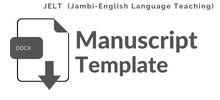PRAGMATIC COMPETENCE AS THE ART OF LANGUAGE USE IN INTERACTION
DOI:
https://doi.org/10.22437/jelt.v1i1.2909Abstract
The ultimate goal of the research was to delineate EFL students‟ bilingual school interaction to find out Pragmatic aspects in term of cooperation among the participants, and politeness strategy. Since pragmatic competence holds important role in language learning instead of linguistic competence. The research subjects were English native teacher and 24 students of third grade of Tunas Mekar Indonesia Elementary School. To find out pragmatics‟ aspects of the interaction, the researcher analyzed teacher‟s and students‟ utterances by transcribing, coding and classifying them based on the theory. The findings show that pragmatic competence is very needed to be applied in the interaction, the teacher should be first model for their students in the classroom communicative activity. The teacher‟s utterances or speech acts should be understandable by the students, thus ultimate goal of communication can be shared. Pragmatics deals with some aspects which can be implemented as references to conduct manner through language use contextually and appropriately. It directs the participants to cooperate achieving communication goals through various guidance which reflect good values and politeness strategy of language use. In another word, it is the art of language use in the interaction.
Key words: Pragmatic Competence, Speech Act, Cooperative Principle,
Politeness










